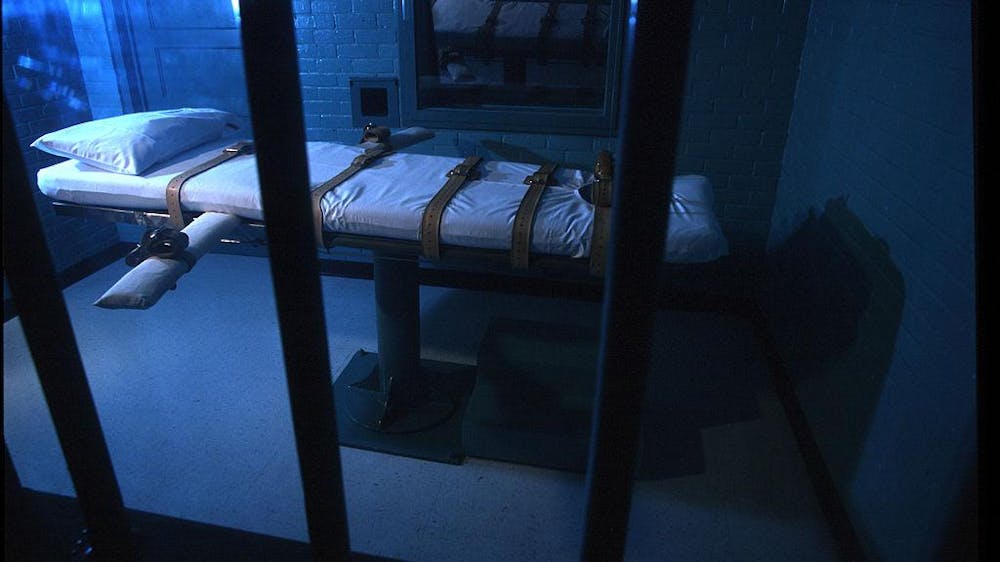About two weeks away from scheduled execution, Indiana death row inmate Joseph Corcoran’s last-ditch attempts to quash his capital punishment sentence are still up in the air.
Currently, Corcoran is scheduled to be executed before sunrise on Dec. 18.
His legal team faces a Tuesday deadline to file a final response in their motion to stay the execution. It will be up to the state’s supreme court justices to decide in the coming days whether to grant that request.
Indiana Attorney General Todd Rokita’s office — which in June asked the high court to set Corcoran’s execution date after the state acquired the necessary drugs to carry out the death sentence — has adamantly rejected the request to put the execution on hold.
State attorneys maintain that Corcoran “is competent to be executed,” despite repeated claims by the inmate’s attorneys that insist Corcoran is “seriously mentally ill” and therefore should be taken off death row.
Separately, Corcoran’s clemency request has yet to be accepted by the Indiana Parole Board. Although his lawyers have filed the petition on his behalf, Corcoran himself has not signed the necessary paperwork.
As of Monday, the parole board had not received the clemency petition with Corcoran’s signature. The board’s clemency calendar additionally does not list a pending hearing for Corcoran, which is required to take place in Indianapolis upon successful submission of a petition.
Unsigned clemency petition
In a Nov. 18 filing to seek a stay of execution, Corcoran’s attorneys argued it’s cruel and unusual punishment to execute someone who is seriously mentally ill. They said in court documents that paranoid schizophrenia “completely removes him from reality,” adding that Corcoran “cannot distinguish between reality and his delusions and hallucinations — his delusions are his reality.”
State and federal defense lawyers said, too, that throughout his legal proceedings, Corcoran “has been unable to assist counsel with his defense and has been unable to make rational decisions about his case.” The inmate, the lawyers added, “wants to be executed, and is in fact eager for his execution,” because he believes death will relieve him from symptoms of mental illness.
Larry Komp, lead federal attorney for Corcoran’s legal team, previously told the Indiana Capital Chronicle that similar arguments would be made in a separate clemency petition. A decision regarding the last-ditch plea would be left to Indiana’s governor.
But Rokita’s office noted in recent court documents that Corcoran’s post-conviction petitions filed in recent weeks were only signed by his attorneys. Corcoran’s signature is required by law as a condition for filing.
Komp said the state is “refusing to accept the paperwork that we signed as a person on his behalf.”
“We believe this is a brazen violation of the Indiana State Code,” Komp continued.
The attorney general disagreed, writing in a Nov. 26 court filing — in opposition to the motion for a stay — that “not only is Corcoran’s signature required as a legal matter, but it is not even clear that Corcoran himself wants further post-conviction review.”
“It is entirely unclear from his counsel’s filings whether Corcoran personally desires further post-conviction review, and his filings appear to be his attorneys’ unilateral decision to pursue further review without his consent, which is evidenced by the absence of Corcoran’s personal endorsement of these proposed petitions,” state attorneys said.
The attorney general’s office further pointed to court proceedings dating back two decades, when Corcoran “both wanted to be executed and had a rational understanding of the reason for his execution.”
In the early 2000s, when the time was still ripe for Corcoran to initiate post-conviction review, he refused to sign the post-conviction petition.
State attorneys originally offered Corcoran a life sentence if he would accept a plea or waive jury. He refused, prompting the state to file a request for the death penalty two days later, according to court records.
At sentencing, Corcoran stated that he wanted to waive all his appeals.
The most recent filings with the Indiana Supreme Court reference Corcoran’s personal revelations to the post-conviction court in 2003: “See, I want to waive my appeals because I am guilty of murder. I think that I should be executed for what I have done and not because I am supposedly tortured with ultrasound or whatever. I am guilty of murder. I should be executed. That is all there is to it. That is what I believe. I believe the death penalty is a just punishment for four counts of murder, and I believe that I should be executed since I am guilty of four counts of murder.”
The state continues to assert that Corcoran’s legal team has so far failed to present new evidence showing that his “alleged incompetence is motivating his desire to forgo further dilatory review.”
“They have simply signed a petition on his behalf with no indication that their client desires the relief that they seek,” the attorney general’s team wrote. “And the historical record shows that their client does not desire the relief that they seek, which is contemporaneously evidenced by the fact that the proposed successive petitions are not personally signed by Corcoran.”
Execution date looming
The state additionally took issue with repeated claims by Corcoran’s lawyers that their client “was and continues to be severely mentally ill,” and as such, should be ineligible for the death penalty.
“His attorneys continue to rely on his diagnosis of paranoid schizophrenia from 1999 to argue broadly that people like Corcoran who suffer from ‘severe mental illnesses’ should be exempt from the death penalty,” state attorneys wrote. “Corcoran is competent to be executed, and his attorneys’ case for incompetence rests on a factual premise that Corcoran admits is a lie.”
Rokita’s team emphasized that Corcoran “admitted he fabricated this delusion” in a letter to a federal district court in 2006:
“And I admit that in about August of the year 2000, or maybe earlier, I made up a story that the prison is tormenting me with ultrasound. According to my story they use ultrasound to cause muscle spasms, abnormal feelings, and to make sound effects appear out of no where. Also according to this story I have an involuntary speech disorder where I involuntarily say things in such a way that I don’t hear but in a way the prison can monitor it and as they do they make me spasm and experience abnormal feelings and make sound effects at me. … I tried to hint to [attorneys] that these things don’t really happen but I got accused of down playing my symptoms—symptoms I do not have but I made up such as hearing sound effects or taunting music. They saw this as evidence of hallucinations but I made up the whole thing. I never realized before this that psychiatrists could be so gullible.…I do not believe that I am being tormented with ultrasound and that I involuntarily say things. As I said, it is a fictional story.”
But more recent court records show that in March 2024, treating Department of Correction personnel noted Corcoran “began sharing information about what he believes to be an ultrasonic machine here at (Indiana State Prison) that can control his and others thoughts, sleep, voice, etc. Patient reports it is ‘top secret’ but it bothers him ‘endlessly all day.’”
“Patient reports the machine does put him to sleep at night,” the note described. “Patient stated ‘others think I’m delusional but I know its here.’ Writer inquired if patient ever recognizes his own thoughts as delusional, patient avoided the question. … Patient denies (mental health) symptoms and the expressed delusions are the only observable concern.”
Rokita, pushing back again, referenced a DOC doctor’s June 2024 note stating that Corcoran “denies hearing or seeing things that are not there.” The state pointed to other portions of that doctor’s note, as well, which said indicated that Corcoran is “oriented to person, place, time and situation,” that his “speech is linear, goal-oriented and future oriented,” and that his “[i]nsight” and “[j]udgment are “[f]air.”
Today, the attorney general’s office concluded, “the law presumes Corcoran to be sane and competent to be executed.”
Even so, Corcoran’s legal counsel has suggested there is increasing tendency nationwide to exempt those with mental illness from the death penalty — making the case for the inmate’s appeal window to be reopened.
The state doubled down, however, that proposed laws to prohibit the death penalty or execution for “severely mentally ill” defendants have not passed in most states, including Indiana.
The state supreme court set a noon Tuesday deadline for Corcoran’s legal counsel to respond to the state’s filing in opposition.
Corcoran’s Indiana public defender, Amy Karozos, told the Capital Chronicle on Monday that a reply to the state’s response will be filed before the deadline.
“A stay of execution is warranted to allow Mr. Corcoran the meaningful opportunity to present the claims raised including that he is incompetent to be executed,” she said.





